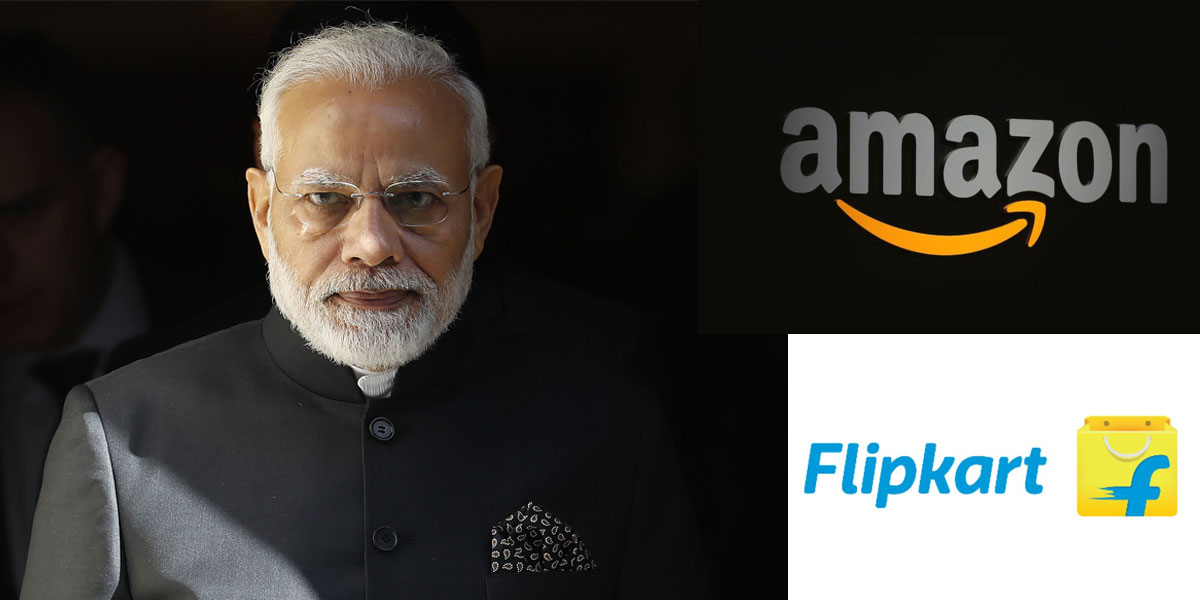Live
- TG has 234 enemy properties; RR district tops the list
- MEIL dispatches refinery equipment for Mongolia
- 265 SCTPCs take oath in Rachakonda
- Commissioner CV Anand urges dedication as 747 SCTPCs take oath
- 270 trainee PCs passing-out parade held at Cyberabad
- Beware of bacterial predators
- Empowering youth for Viksit Bharat
- Antibiotic Awareness Week (Nov. 18-24): Beware of bacterial predators
- MyVoice: Views of our readers 22nd November 2024
- Young Leaders Dialogue: Empowering youth for Viksit Bharat
Just In

Indias new curbs on ecommerce companies may not be enough to win over small store owners and traders in next years general election, with the key voting bloc still seething over what it sees as broken promises by Prime Minister Narendra Modi
India’s new curbs on e-commerce companies may not be enough to win over small store owners and traders in next year’s general election, with the key voting bloc still seething over what it sees as broken promises by Prime Minister Narendra Modi.
From Feb. 1, e-commerce firms such as Amazon.com and Walmart-owned Flipkart Group will not be able to sell products from companies in which they have an equity interest or form exclusive agreements with sellers.
Intended to prevent predatory pricing and deep discounting, the curbs follow intense lobbying by India’s many millions of small shopkeepers and the middlemen who serve them, particularly after Walmart this year spent USD 16 billion to acquire Flipkart.
The sector, which includes an estimated 25 million small store owners, largely supported Modi in the 2014 general election. While seeing the new rules as a step in the right direction, many small businesses feel too much damage has been done after Modi went back on promises that he would not allow the entry of foreign companies into the domestic retail sector.
“We clapped and voted for Modi believing in his promises. But what have we got is just a slap on our face,” said Pankaj Revri, president of a furniture market association in central Delhi.
The curbs, announced on Wednesday, surprised foreign e-commerce firms as little had been done by the government despite over three years of lobbying by domestic retailers.
Modi’s Hindu nationalist Bharatiya Janata Party is widely viewed as panicking after losing five state elections this month. The government, which must hold a general election by May, is also expected to come up with new support programs for farmers as their opposition grows due to low crop prices.
An opinion poll by TV channel ABP News this week predicted Modi’s party could fall short of a majority if the opposition forms an effective alliance in the national election.
B.C. Bhartia, president of the Confederation of All India Traders, said some small businesses had seen earnings more than halve in the last few years as they struggle to compete with low prices offered by the American-controlled behemoths.
“The last-minute policy change is too little and too late,” he said.
In particular, retailers and traders believe Modi turned a blind eye to what they say was the use of policy loopholes by major e-commerce companies to offer heavy discounts that allowed them to seize market share for goods such as electronic items.
Asked about those accusations, Amazon India said in a statement that it had always operated “in compliance with the laws of the land” and that had more than 400,000 small and medium businesses on its marketplace.
Flipkart declined to comment on the specific allegations.
Small Indian businesses have also been bruised by other Modi policies, including a sudden ban on the use of high-value currency notes in late 2016 and the launch of a national sales tax in 2017, both of which raised compliance costs.
Bhartia said if the government was serious about the concerns of small traders, it should prosecute violators of trade rules and appoint an independent regulator to curb malpractice.
A government official told reporters on Thursday the administration could consider demands for a regulator in its new e-commerce policy, expected to be released in the coming months.
A September report by PricewaterhouseCoopers estimated online commerce in India would grow 25 per cent a year for the next five years, hitting USD 100 billion a year by 2022.
The new curbs could harm those growth prospects and discourage some foreign investors, said investment consultants.
“Sentiment is definitely hurt,” said Harminder Sahni of retail consultant Wazir Advisors, adding that the policy suggested online retail business should only be done by Indians.
Amazon said in its statement it was evaluating the new guidelines to engage as necessary with the government so it could remain true to its vision of “transforming how India buys and sells and generating significant direct and indirect employment.”
Flipkart said the advent of e-commerce had created hundreds of thousands of jobs and “the industry was set to be a major growth driver for the Indian economy and create millions of jobs in the future.”
“It is important that a broad market-driven framework through the right consultative process be put in place in order to drive the industry forward,” it added.
The government boasts of attracting nearly USD 223 billion foreign investment in the last four years, compared with about USD 152 billion in the previous four years.

© 2024 Hyderabad Media House Limited/The Hans India. All rights reserved. Powered by hocalwire.com







